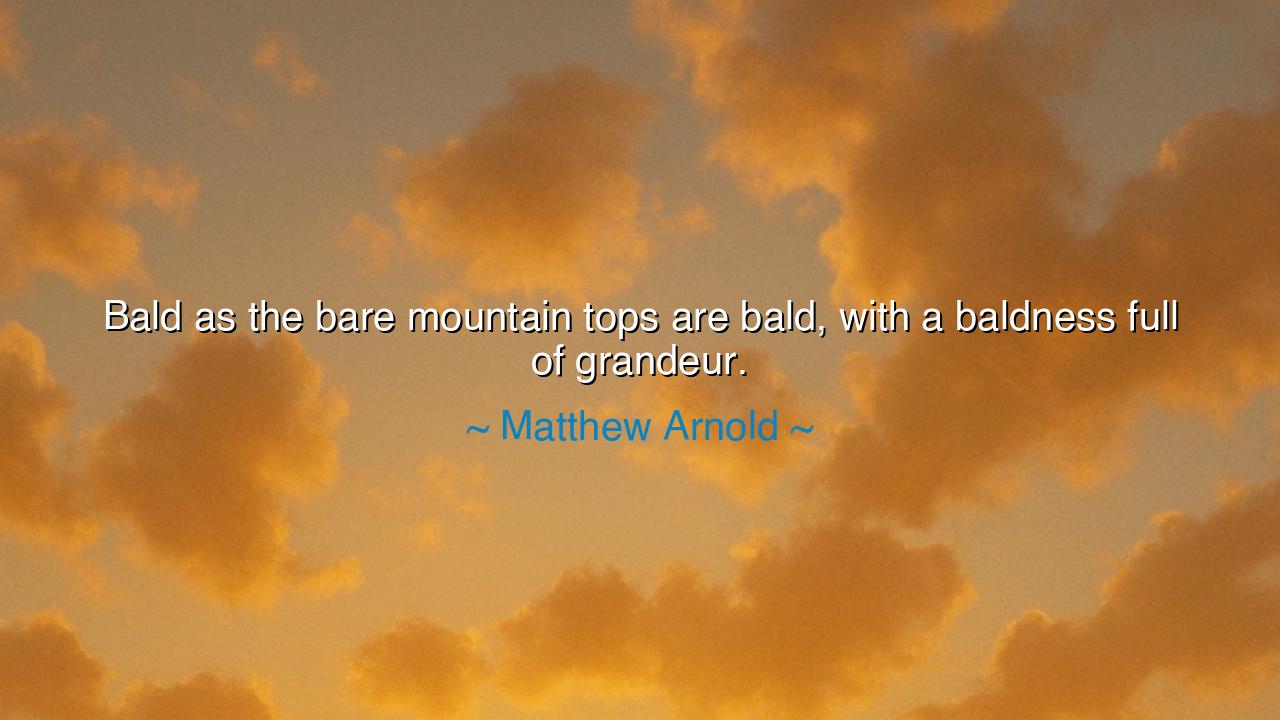
Bald as the bare mountain tops are bald, with a baldness full of






Hearken, children of reflection, to the words of Matthew Arnold, who spoke of the austere beauty of the world: "Bald as the bare mountain tops are bald, with a baldness full of grandeur." In these words lies a meditation on the majesty of simplicity, the strength in austerity, and the quiet power of forms unadorned. Arnold reminds us that grandeur need not wear embellishment, that the stripped, the exposed, the minimal can evoke awe, dignity, and the sublime.
The first revelation is that baldness is not weakness. To stand unclothed of forests, flowers, or superficial ornament is not to diminish the mountain’s significance; it is to reveal its essential form. The naked peaks command reverence precisely because they display the raw geometry, scale, and permanence of nature. Likewise, in human life, those who lay aside artifice, pretense, or unnecessary adornment reveal the strength and dignity of their core character.
History offers mirrors of this truth. Consider Abraham Lincoln, a figure unadorned by ostentation, whose plain speech, simple dress, and direct manner concealed the profound grandeur of wisdom, empathy, and moral courage. In his simplicity lay a power far greater than any ornament or display could provide. Like Arnold’s mountains, Lincoln’s baldness of style concealed a majestic inner stature that shaped a nation.
Arnold’s observation also speaks to the beauty of endurance. The bare mountain tops, stripped by wind, snow, and time, stand immutable against the elements. Their baldness is testimony to resilience, a visual record of survival and strength. So too, in human life, those who endure trials, privations, or hardships without complaint manifest a quiet grandeur, a dignity forged through struggle rather than adornment.
Consider the lives of hermits and sages, such as Diogenes of Sinope, who renounced worldly luxuries and lived among simplicity, yet whose wisdom and boldness shone brighter than any gilded court. In renunciation, he revealed the grandeur of essence, demonstrating that the stripping away of excess allows the essential to speak with clarity and power. Arnold’s mountains, like Diogenes’ life, teach that grandeur resides in what remains after the unnecessary is removed.
This teaching also calls for perception beyond surface appearances. What seems barren, cold, or austere may, to the discerning eye, radiate majesty, wisdom, and awe. Just as travelers gaze upon mountain peaks with reverence, so should we behold the simplicity and minimalism in human character, in institutions, or in art. True appreciation requires attentiveness and understanding, for grandeur is not always adorned or loud.
Practically, the lesson emerges: cultivate simplicity, resilience, and essence in your life. Strip away unnecessary pretension, excess, and distraction, and allow the core of your being to reveal its innate power and dignity. Embrace challenges as the elements strip away weakness, and let your baldness—your authenticity—shine with quiet majesty.
Thus, let this teaching echo through generations: the bare mountain tops are bald, yet their austerity is full of grandeur. In simplicity lies strength, permanence, and awe. Walk unclothed of artifice, endure with dignity, and allow your essence to stand exposed, for it is in the raw, the stripped, and the unadorned that true majesty and wisdom are revealed.






AAdministratorAdministrator
Welcome, honored guests. Please leave a comment, we will respond soon